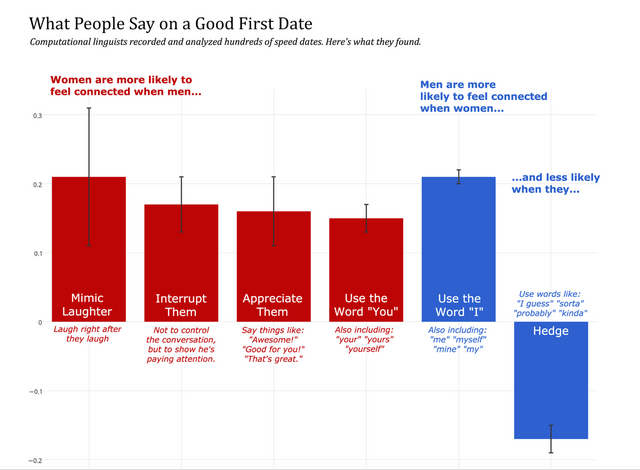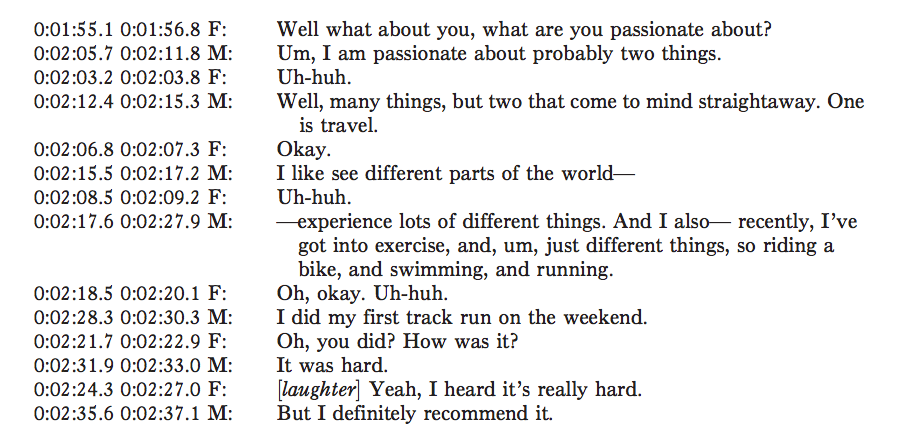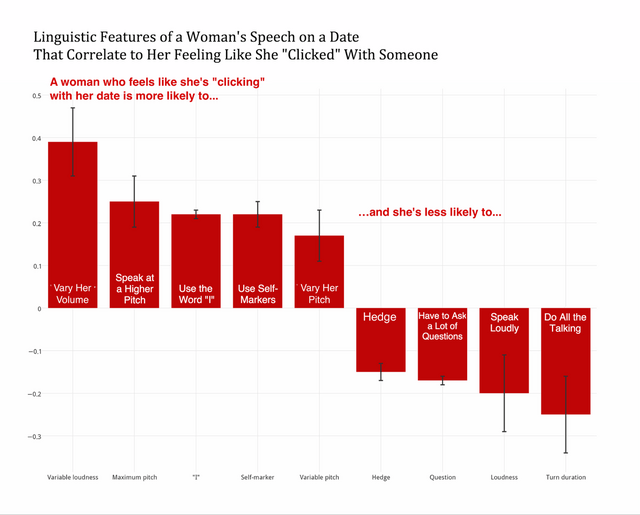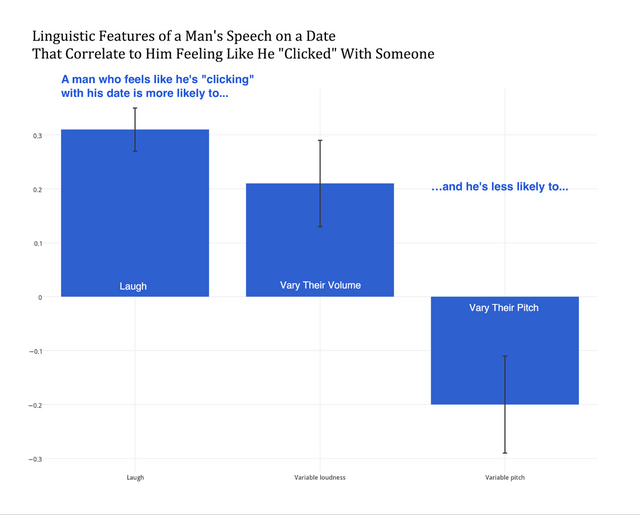
Features of a person’s speech that correlate to their date feeling like they “clicked”, by gender. (p < 0.05); Rosie Cima, Priceonomics; Data: Jurafsky, McFarland, Rawlings
Romantic attraction is one of the biggest mysteries of the human condition: What makes a person feel “connected” to another person? And how do you tell if they feel that way?
Several different segments of society have taken several different approaches to this question. Dating sites try to use big data to help you find the “perfect” match, social psychology research gives us a battery of questions to foster intimacy with anyone.
Researchers out of Stanford University and UC Santa Barbara took a novel approach. They held free speed dating events for graduate students. Participants wore microphones, and their conversations were recorded. After each date, participants filled out a scorecard on how connected they felt to their date:
On the scorecard, actors report how well they click with their partner on a scale of 1-10, from “not at all” to “very much.” We term this Clicking.
The researchers then had the recordings transcribed. This resulted in transcripts and audio of 947 speed dates, and data from both parties on how well they thought the date went. The researchers called this database the Speed Date Corpus. It includes such gems of dialogue as the following:

“Um, I am passionate about probably two things.” Source: Jurafsky, McFarland, Rawlings
From the transcripts and audio recordings in the corpus, they attempted to extract which linguistic features best correlated with “clicking.” Then they went back into the corpus and did their best to interpret the correlations based on actual utterances. (The paper includes a discussion of correlation and causation, and how it isn’t clear from the data alone which features are attractive and lead to clicking, and which features result from a feeling of already having clicked. Another thing to note is the analysis is limited to heterosexual dating encounters: men on dates with women, women on dates with men.)
The More Articulate Sex
When looking at the pattern of clicking overall, they found that women reported clicking far less frequently than men. Also, when they looked for linguistic features that correlated to clicking at a statistically significant level, they found the women’s reports of clicking correlated with more linguistic features than the men’s reports. The interpretation they give in their paper is that this shows, “women give off and interpret more communicative signals.”

Features of a woman’s speech that correlate to her thinking that she “clicked” on a date. (p < 0.05); Rosie Cima, Priceonomics; Data: Jurafsky, McFarland, Rawlings

Features of a man’s speech that correlate to him feeling like he “clicked” on a date, (p < 0.05); Rosie Cima, Priceonomics; Data: Jurafsky, McFarland, Rawlings
Among the study’s more surprising findings is that both men and women are more likely to report a feeling of connection if the conversation centers on the woman (detected by her using words like “I”, “me”, “mine”, and him using words like “you”, and “yours”.) And the more questions a woman asks on a date, the lower the probability that she’s “clicked” :
We found that questions were used by women to keep a lagging conversation going […] By contrast, successful dates were associated with coherent outputs of narratives from the two partners, with long runs of high-energy, shared stories and few questions.
Relatedly, a woman is more likely to think she and her date have clicked if he’s interrupted her more. But researchers also found that the men on these dates weren’t interrupting to say, “Hey I have an idea, let’s talk about me!” Instead, the interruptions functioned “as a means of alignment and shared understanding.” A woman starts talking about a concert she went to, her date interrupts to say that he loves that band. A woman starts explaining her feelings on something, her date interrupts to acknowledge that he’s paying attention.
Lost in Translation
The funniest thing is about the analysis is how little translates between genders. Women are more likely to feel connected when men laugh when they laugh, appreciate them, or interrupt them. But men who feel like they click aren’t more likely to do these things at a statistically significant level.
There are two exceptions: (1) both men and women are less likely to feel they clicked on a date when the woman hedges more (uses words like “kinda”, “sorta”, “probably”) — researchers say this signals discomfort and disengagement — and, (2) both men and women are more likely to feel they clicked on a date when the woman talks more about herself (uses words like “I”, “me”, “mine”).
The researcher’s aggregate conclusion from this extremely detailed and labor intensive analysis was a relatively reasonable portrait of a good first date: A heterosexual couple on a good first date pay attention to each other, show each other they’re listening, are kind and agreeable, and — interestingly — focus the conversation on the woman.
This post was written by Rosie Cima; you can follow her on Twitter here. To get occasional notifications when we write blog posts, please sign up for our email list



